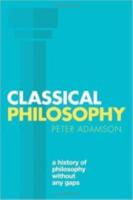
OUP (2014) h/b 346pp £20.00 (ISBN 9780199674534)
This is the first volume in a series called ‘A History of Philosophy Without Any Gaps’ and is based on the author’s lengthy series of podcasts on the subject. Podcasts are, of course, meant to be listened to whilst on the move, and so the style is approachable, raconteurish and amusing, while also seeking to give us essential information and brief discussion of key thinkers, and it certainly succeeds in being ‘entertaining but not over-simplified’ as A. hopes. The text is not however simply a transcript, and we are assumed to be readers rather than listeners. His important page on Aristotelian syllogisms, for example, would not come well over the air-waves (try reading it aloud and you will see) and yet is lucid in print.
He begins with the Presocratics, lingers briefly on the Sophists and the Medical Writers and then moves on to Socrates/Plato and finally Aristotle, with separate chapters dedicated to important works and themes, so that Gorgias and Meno get one chapter each, Republic and the Nicomachean Ethics get two each, while Rhetoric and Poetics are merged into one chapter and poor old Plato’s Laws (which he dismisses as ‘hugely long and, most readers tend to feel, hugely boring’) gets nothing at all. The style is witty and the chapter-headings abound in puns (‘Untying the Not—Plato’s Sophist’) and witty allusions (‘Old Man River—Heraclitus’, ‘The Road less Travelled—Parmenides’). The thought is well explained with modern analogies, and A. includes some entertaining tales along the way such as Thales cornering the market on olive-presses and Pythagoras and his golden thigh; he also gives us balanced discussions of Aristotle’s highly un-PC views on slavery or Plato’s treatment of pederasty which avoid the blanket condemnation of views now held to be anathema without giving any quarter to the Ku Klux Klan or the seamier end of the internet. Sometimes the flippancy can become mildly irritating, such as his silly treatment of Aristotle’s life on page 208-9, but he always gets full marks for entertainment value and students will probably love it.
In terms of accuracy, I am not convinced that he is successful in distinguishing Callicles’ position in Gorgias from Thrasymachus’ in Republic 1: the latter speaks as the disgruntled underdog and proposes committing unjust acts even though they are unjust, since ‘right’ is in practice reducible to ‘might’, whereas Callicles proposes a radical ‘higher’ law whereby ‘might’ really is ‘right’. His Greek is wobbly in places—the accusative of doxa is doxan and not doxon (p.44) for instance—but these are minor flaws in what sets out to achieve the impossible and does a great job of it. Readers new to the subject will find his enthusiasm infectious and be drawn in to reading more, and those of us who think we know this stuff will certainly enjoy the ride on his Cook’s-tour of a vast philosophical continent.
The bibliography is excellent and points us towards deeper discussions of areas where A.’s limited compass can only whet the appetite. This is one of the very few books on Classical Philosophy which can be read on the train—or on the beach—and it is ideal for the introducing readers (at a highly affordable price) to the delights and the fascination of Greek philosophy.
Dr John Godwin—Moreton Hall School, Oswestry
